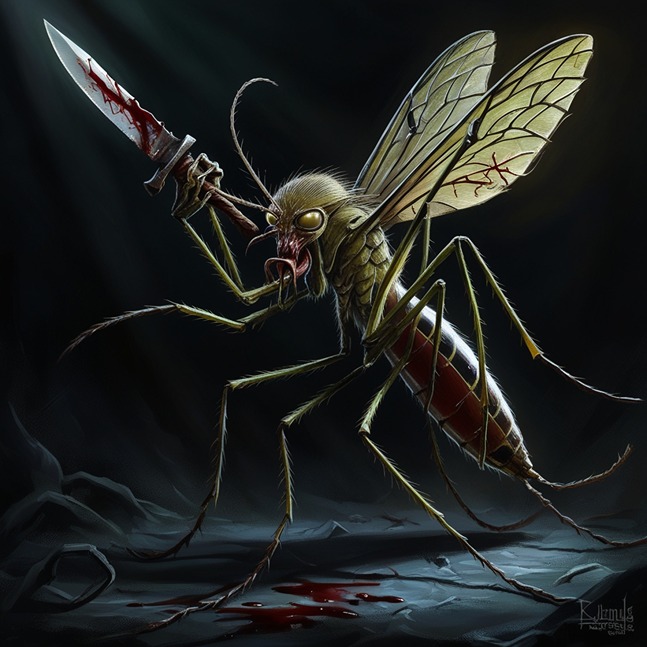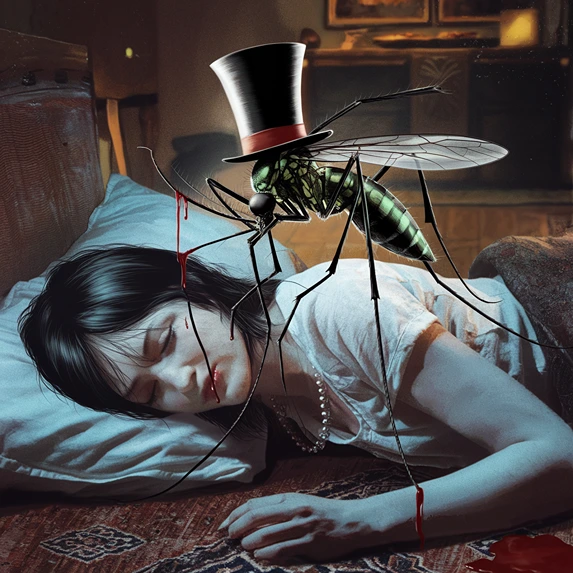Don’t Get Stung: Mosquitos Are The Deadliest Animals, Easily
When we think of the most deadliest animals in the world, many of us almost automatically think of large predators such as sharks, lions, or bears. Others will bring before their eyes animals that are indeed a little smaller, but dangerous with any sting, bite, or whatever: snakes, spiders, and so on. It’s pretty natural, and you can also blame the horror movies for this, which cultivated these animals to the level of genuine monsters. The dry data, however, show that size doesn’t matter. The deadliest animals in the world are the mosquitos, which beat the rest of the scary animals by knockout.
In the following article, we will learn:
🦟Why are the mosquitos so bad to us?
🦟How many people die from mosquitos a year?
🦟How to keep mosquitos away?
🦟What else is on the list of the most dangerous animals in the world?
The Most Dangerous Animals In The World: Mosquitoes, By Far
In recent years, many lists, studies, and data have tried to discover the most dangerous animals in the world which are attributed to the most deaths each year.
It is essential to stop and clarify that this test is complex because sometimes death is indirect. If we take the mosquitoes as a representative example, they will lead to indirect death due to diseases such as malaria. It is, therefore, difficult to accurately quantify the number of kills of each animal, although there is no doubt that the lead is taken by mosquitoes by a considerable margin.
According to published data, mosquitoes are responsible for no less than 750,000 deaths yearly worldwide, with some estimates approaching a million. That’s more than half the deaths caused generally by animals each year. If we add the number of kills of all the animals, we still will not reach the number of mosquitoes. By comparison, sharks – which are considered extremely scary and dangerous animals – are responsible for something like 10-15 deaths per year. Many believe it is even lower than dying from a falling coconut, just a random example.

What’s Else On The List Of World’s Deadliest Animals?
In any list of the most deadliest animals in nature, you should probably find:
- Humans – yes, it does sound like a criticism of the evil nature of humanity, but the precise data is that every year, there are approximately 400,000-500,000 murders of humans. Which means it ranks very high on the list.
- Snakes – responsible for about 100,000-50,000 deaths per year.
- Dogs – believe it or not, but man’s best friends cause about 25,000-35,000 deaths a year, either due to physical injury or as a result of the transmission of rabies.
- Cha-cha flies – unfortunately, these flies (primarily common in Africa) do not cause the cracking of the cha-cha dance, but the fatal sleeping sickness, from which about 10,000 people die a year.
- Carnivorous – a family of about 1,000 species of carnivorous bedbugs. Different species can cause the death of about 12,000-10,000 people a year.
- .Freshwater snails – responsible for about 10,000 deaths a year through the transmission of dangerous parasites, of course
- Scorpions – Cruel predators on Earth for hundreds of millions of years. Over 3,000 deaths are attributed to them each year.
With a quick search, you can find different lists of the deadliest animals in nature in various periods. For example:
- The 25 most dangerous animals in nature
- The 24 deadliest animals on Earth, ranked – from the CNET research website in 2016
- The 30 Deadliest Animals In The World – Explore
- The 72 most dangerous animals in Australia – from a National Geographic program broadcast on Netflix (there were similar programs about other regions: the 72 most dangerous animals of Asia and the 72 most dangerous animals of Latin America, and more)
What you can see is that the animals that are considered the most terrifying by many – or if you will, but that have starred in many horror films about survival against brutal nature, for example, sharks, crocodiles, lions, or bears – are not really on this list, mainly because the encounters of man with them are pretty rare. Still, one can understand the creators of horror films. With all due respect to the statistics, a shark is much more cinematic and visually frightening than a mosquito.

The (Not So) Silent Killer: On Malaria And Other Troubles
Every summer until the beginning of autumn, we hear about diseases like the West Nile fever, arriving in many locations around the globe. This viral disease is transmitted to humans through the bites of female mosquitoes from various animals. Although in the vast majority of cases, a person infected with the virus is not in danger or will develop symptoms, every year, there are several hundred infected, and unfortunately, also dozens of deaths.
The bigger problem with mosquito bites is the malaria epidemic, an infectious disease that is considered one of the leading causes of death in the world. In relatively mild cases, the disease will cause flu-like symptoms. Still, in severe cases, it may cause significant damage to the red blood cells, resulting in irreversible damage to the body’s organs, up to the risk of death.
According to World Animal Foundation, the latest data shows that Malaria can cause 608,000 deaths per year. The disease is expected mainly in tropical or subtropical regions and third-world countries on the African continent ( About 90% of all deaths in the world are in Africa, mainly in the sub-Saharan region), South America, and Southeast Asia. Children are the leading risk group for the disease; most of the deceased are under the age of 15, and the risk is exceptionally high for children under the age of five.

Besides Malaria, mosquitoes are carriers of other dangerous diseases, such as:
🦟 Dengue Fever – a viral disease transmitted through the bites of Asian tiger mosquitoes. It is usually harmless and asymptomatic, but in some cases it can be fatal
🦟 Yellow Fever – common mainly in Africa and South America. If you are going to travel in these countries, it is vital to get vaccinated against the virus
🦟 The Zika Virus – infection occurs through the bites of the Egyptian Aedes mosquito but may also occur through sexual intercourse with a person infected with the virus. The Zika Virus is especially dangerous for pregnant women because the virus can pass to the fetus
🦟 Chikungunya – a viral disease that is considered a little less deadly but may be accompanied by unpleasant symptoms such as high fever, headaches, arthritis, rashes, bleeding and weakness
Here is a short video about mosquitoes from the Love Nature channel, which perhaps shows why there are animals in nature that we must the careful of:
Mosquitoes Are A Matter Of Geography (And Time)
You don’t need to be an expert in epidemiology or mosquitoes to understand why the risk is more significant in some parts of the world. It starts from the poverty that characterizes the areas with high mortality levels, where a lack of sanitary infrastructure and efficient health systems can increase vulnerability to disease. In these areas, there are ideal conditions for mosquitoes to breed, whether due to the hot and humid weather conditions, the increase in the population, or more.
The global movement facilitates the transfer of diseases from country to country, even if it is usually a relatively small number, with most viruses (and their mortality) remaining in the areas of origin.
Despite the alarming numbers, the encouraging news is that in recent decades, there has been a significant decrease in the number of mosquito-related deaths. For example, the number of deaths from malaria decreased by about 60% between 2000 and 2015. However, these are still very high numbers, with global warming raising concerns about spreading mosquito-borne diseases to new areas.
How To Prevent Mosquito Bites?
In order not to enter the brutal statistics of mosquito attacks, it is crucial to make fairly essential efforts to deal with them – especially if you come to areas with many mosquitoes that transmit dangerous diseases. In such cases, it is necessary to find the instructions regarding the destination, get all the required vaccinations, and arrive with the essential safety measures, whether to keep mosquitoes away or deal with bites.
So, what the hell do you do about mosquito bites? Here are some very general tips to avoid the deadliest animals are there:
🦟 It is recommended to wear long clothes in areas prone to disasters. Research shows that mosquitoes are attracted to dark colors, so light clothing may keep you safe
🦟 use mosquito repellents (and other pests), preferably without pesticides
🦟 There are natural scents that are known to repel mosquitoes, such as lavender, citronella, basil, mint, or rosemary
🦟 Traveling abroad? Check that the place you are going to offers the infrastructure to keep mosquitoes away, for example, nets in the windows in rural guesthouses or nets (nets installed around beds)
🦟 Try to sleep with fans or air conditioners on, if possible. Mosquitoes are tiny, so they prefer to avoid any breeze
🦟 On a more general level, we must keep mosquitoes away and reduce their reproduction locally, such as by emptying water tanks and drying water sources




